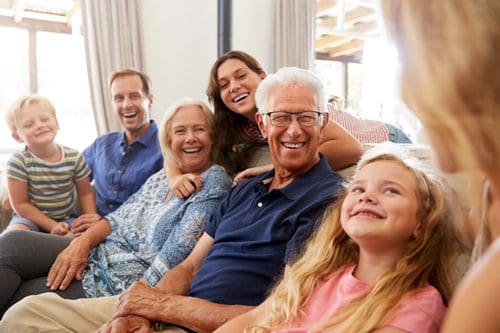 You have an army of people who want you to be well—although it doesn’t always feel like it. The isolation, fear, shame, guilt, and other negative aspects of addiction tend to shadow the most positive interactions and relationships.
You have an army of people who want you to be well—although it doesn’t always feel like it. The isolation, fear, shame, guilt, and other negative aspects of addiction tend to shadow the most positive interactions and relationships.
Addiction Is a Family Disease
Regardless of what happened during the most challenging times of your addiction, many of your family members simply wanted to you be healthy and happy. Yes, everyone was emotional—perhaps even angry, disappointed, or neglectful. Parents feared for your life and struggled with feelings of helplessness, guilt, and exasperation. Siblings and extended family members might have traveled this emotional roller coaster as well. Addiction is a family disease, and everyone involved suffers as a result.
While your brave choice to enter rehab and recovery has personal benefit, it’s advantageous for your family members as well, because now is the time for everyone to start healing.
Many Small Steps Create a Journey
Incremental changes happen when someone is recovering from addiction, each at particular stages.
While you’re in treatment
- Take advantage of every opportunity to engage with family members as your continuum of care plan and therapy allows. Short visits or phone calls are usually permitted after a certain period of time.
- You always have a right to direct the narrative: how you want to talk about what led to addiction and how you’re identifying triggers are totally within your control. Honesty and good communication are essential aspects, but discussing challenging topics might not be a good idea in the beginning. Talk with your therapist about appropriate topics and methods for framing conversations properly.
- Reconnect with family members regarding aspects of their lives—they’ll appreciate your attention. Use the reflective listening skills you gain during group therapy sessions to truly understand their perspectives.
- It’s possible that during treatment, your program will offer family therapy. This has various benefits but can also be a serious undertaking. Everyone deserves to heal, so do your best to create space for your growth and that of your family.
After rehab
- Even though everyone thinks they know what’s best for you, they actually won’t know unless you open a dialogue. It’s easy to feel overwhelmed and even a little defensive about your next steps. Instead, speak up about what you need to avoid triggers. Stay calm, but be direct when asking for or deferring help. Remember, your family members are learning, too.
- Create partnerships instead of falling into an enabling trap, because this scenario isn’t good for anyone. You might think letting people do everything for you makes the recovery road easier, but too often it just compounds resentment and prompts old habits. For example, if you need financial help, housing, or other basic needs from family members until you get back on your feet, develop an action plan with a timeline that respects the efforts of everyone.
- Work on aspects of compassion, forgiveness, appreciation, and gratitude. This may be simple to do with some people, and much more challenging with others. Ask for patience as you figure it all out.
Further into recovery
- Invite family members to support groups and meetings. It helps them understand that just because you completed rehab, your focus on healthful living is ongoing. Attending meetings together also helps them move forward and demystifies what’s happening with you.
- Remember, the dialogue window remains open. Things you couldn’t talk about before may need to be addressed now. You might have to hear their grievances—and they need to listen to yours. Lessons learned in family therapy should be put into action.
- Take time to celebrate and create new rituals. If there was estrangement, rocky interactions, and other negative associations because of your addiction, everyone is ready for joy, hope, and fresh perspectives now. With a little luck—and a lot of love and attention—you and your family can move forward to build stronger relationships, and create lives that reflect how you’re progressing together.
And What If Your “Family” Isn’t Like the Rest?
Without question, many people don’t have the stereotypical family unit. There are myriad reasons for this—most of which are unfortunate and perhaps contributing factors to your condition. Conversely, maybe you’ve had to break free of toxic relationships with biological family members in order to make progressive changes in your life.
Remember, the people you choose as family matter most, even if they don’t fit a particular definition. Trusted friends, supportive colleagues from work, members of a church group, people who share your hobbies, a recovery network such as Alcoholics Anonymous or Narcotics Anonymous, even an online peer group—all these people can become members of your family. Individuals who belong in your support network believe in your worth and your right to a healthy life. Ask for help, show gratitude, and work on cultivating reciprocal relationships with meaning and purpose.
Family Support at Twin Lakes
Our philosophy is to provide the best support, education, and involvement possible to empower you and your family members to build healthier lives. This is why we offer the Family Recovery Program: a two-day onsite event at our residential facility in Monroe, Georgia.
Families learn about addiction and co-occurring behavioral health disorders, and how best to support their loved ones after rehab and during a life of recovery. Family members also get to meet other people who walked the same path and establish an extended care network. The staff of Twin Lakes provides community resources to widen the circle of support for all of you. It’s a worthwhile event that allows you and your family to overcome adversity together.



